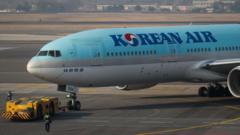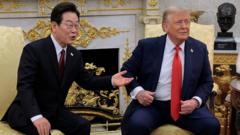Is Korean Air's Massive Boeing Jet Purchase the Result of Trump's Influence?

Published: 2025-08-26 00:28:13 | Category: technology
US aviation giant Boeing has secured a significant deal with Korean Air for 103 aircraft, which includes the 787, 777, and 737 models. This partnership aims to modernise the South Korean flag carrier's fleet, enhancing its competitiveness, especially in light of its upcoming merger with Asiana Airlines. The announcement coincided with South Korean President Lee Jae Myung's discussions with President Donald Trump about the recent tariffs imposed on South Korea.
Last updated: 16 October 2023 (BST)
Overview of the Boeing-Korean Air Deal
This landmark deal between Boeing and Korean Air signifies a crucial step in strengthening trade relations between the United States and South Korea. With the aircraft deal encompassing a mix of Boeing's most popular models, it showcases both companies' commitment to advancing the aviation sector. As Korean Air prepares for its merger with Asiana Airlines, the acquisition of these new jets is expected to enhance the airline's operational efficiency and service quality.
Key Takeaways
- Boeing has signed a deal with Korean Air for 103 aircraft.
- The deal includes 787, 777, and 737 models, which are known for their efficiency.
- This agreement aims to modernise Korean Air's fleet as it merges with Asiana Airlines.
- The announcement followed a meeting between South Korean President Lee Jae Myung and US President Donald Trump.
- The deal may influence ongoing discussions about tariffs between the two countries.
The Impact of the Deal on Korean Air
Korean Air's decision to modernise its fleet comes at a pivotal time as the airline navigates its merger with Asiana Airlines. The addition of Boeing's advanced aircraft is expected to provide several advantages:
- Operational Efficiency: The new aircraft are designed for better fuel efficiency, which can lead to significant cost savings over time.
- Enhanced Passenger Experience: The modern jets come equipped with the latest technology, improving comfort and in-flight services.
- Competitive Edge: With the merger, Korean Air aims to solidify its position in a highly competitive market, and the new fleet will be essential in that strategy.
Details of the Aircraft Models
The deal comprises three models that are integral to Boeing's commercial aircraft portfolio:
Boeing 787 Dreamliner
The Boeing 787 Dreamliner is renowned for its fuel efficiency and advanced aerodynamics. The aircraft features a composite structure that reduces weight and improves fuel consumption. With a range of approximately 14,000 km, it is ideal for long-haul flights.
Boeing 777
The Boeing 777 is celebrated for its reliability and performance. It is equipped with powerful engines that allow it to fly longer distances with lower operating costs. The 777's spacious cabin is particularly popular among passengers.
Boeing 737
The Boeing 737 is one of the best-selling commercial jetliners. It is favoured for short to medium-haul routes and offers a variety of configurations. The latest version, the 737 MAX, boasts improved fuel efficiency and updated features.
Strategic Timing of the Announcement
The timing of this deal's announcement is noteworthy, as it came shortly after South Korean President Lee Jae Myung's meeting with President Trump. During their discussions, the topic of the 15% tariffs imposed by the US on South Korea was a focal point. This agreement could be seen as a move to strengthen economic ties and mitigate trade tensions.
The Broader Context of US-South Korea Trade Relations
Trade relations between the US and South Korea have been complex, especially in light of recent tariffs. The 15% tariffs imposed in July 2023 were part of a broader strategy by the Trump administration to encourage American companies to increase their business abroad. This deal with Boeing may serve as a counterbalance to the tariffs, showcasing the potential for mutually beneficial agreements.
What This Means for Future Trade Agreements
This deal could set a precedent for future trade agreements between the US and South Korea, emphasising the importance of strategic partnerships in the aviation sector. As both nations navigate their economic relationship, agreements like this could help foster a more collaborative environment.
Challenges Ahead for Korean Air
While the acquisition of new aircraft presents numerous advantages, Korean Air also faces challenges, particularly regarding the merger with Asiana Airlines. Mergers in the airline industry can be complicated and often lead to operational disruptions.
- Integration Issues: Merging two large airlines requires careful planning and execution to ensure a seamless transition for employees and customers.
- Regulatory Scrutiny: The merger will likely attract scrutiny from regulatory bodies, which could delay the process.
- Market Competition: The competitive landscape will continue to evolve, necessitating ongoing innovation and adaptation.
Conclusion
The deal between Boeing and Korean Air is not just a significant commercial agreement; it reflects broader economic dynamics and the evolving landscape of international trade. As Korean Air prepares to modernise its fleet and merge with Asiana Airlines, the implications of this deal will be closely watched by industry analysts and policymakers alike.
What does this mean for the future of aviation in South Korea and beyond? How will these developments influence global trade relations? The answers to these questions will unfold over time as the industry adapts to new realities. #Boeing #KoreanAir #Aviation
FAQs
What types of aircraft are included in the Boeing-Korean Air deal?
The deal includes Boeing's 787 Dreamliner, 777, and 737 models, which are known for their operational efficiency and passenger comfort.
Why is the timing of this deal significant?
The announcement aligned with discussions between South Korean President Lee Jae Myung and US President Trump regarding tariffs, highlighting efforts to strengthen trade relations.
What are the benefits of modernising Korean Air's fleet?
Modernising the fleet with new aircraft will enhance operational efficiency, improve the passenger experience, and provide a competitive edge in the market.
What challenges might Korean Air face during its merger with Asiana Airlines?
Korean Air may encounter integration issues, regulatory scrutiny, and increased competition, which could complicate the merger process.
How does this deal affect US-South Korea trade relations?
The agreement may help mitigate trade tensions and demonstrate the potential for successful partnerships between the two nations, despite recent tariffs.



